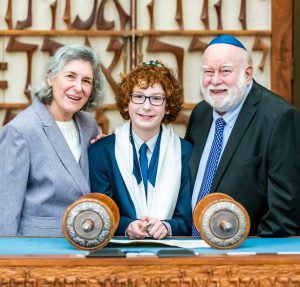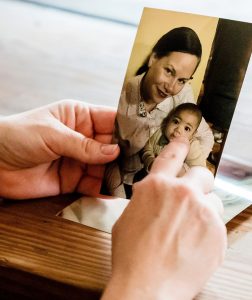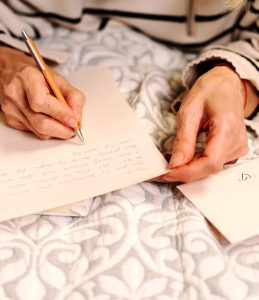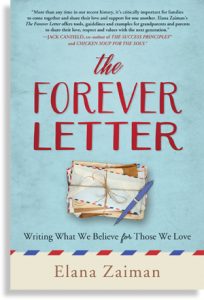It’s a once-in-a-lifetime experience. Your grandchild is becoming B-Mitzvah. You envision them standing on the bimah, or perhaps encircled by family in a home celebration, chanting and singing and sharing the wisdom they have found in the Torah portion.
At this milestone occasion, you may want to share your wisdom, too.

This is a perfect time for a Forever Letter. That’s what I call letters written to connect us with another human being to deepen, heal, or uplift our relationship.
I remember hearing about a letter a grandfather wrote to his granddaughter on the day she was born. He continued to write a letter to her on the same date every month — twelve letters a year. As other grandchildren were born, the grandfather continued the tradition. His letters to his grandchildren numbered over two hundred.
You don’t have to write two hundred letters to be a Forever Letter writer. Some occasions cry out for us to share our insights and deepest thoughts. B-Mitzvah is one such time. Just thinking about your grandchild so grown up can evoke profound feelings.
Even if you don’t consider yourself a writer, you can write a Forever Letter. You just have to be yourself. Write in your own voice. Share what matters most to you.
Here are three steps to writing a Forever Letter.
1. Plan in advance.
- Schedule at least two dedicated hours in your calendar to write. Decide on the place — perhaps a local tea or coffee shop or a favorite room in your home.
- Consider bringing along a few photographs of the grandchild to whom you will write. Looking at the photos may help you bring that grandchild to mind in a more personal way especially if they show the child leaping over the years, from baby, toddler and first day of school to, now, a preteen or teen.
 If writing doesn’t come easily to you, imagine yourself talking with your grandchild over dinner, drinking coffee or a smoothie together, or taking a walk. Think about what you most want to say to this beloved being. Tell your grandchild about your own B-mitzvah, if you had one. How do you hope your grandchild’s celebration will be similar or different? If you didn’t have one, do you wish you had?
If writing doesn’t come easily to you, imagine yourself talking with your grandchild over dinner, drinking coffee or a smoothie together, or taking a walk. Think about what you most want to say to this beloved being. Tell your grandchild about your own B-mitzvah, if you had one. How do you hope your grandchild’s celebration will be similar or different? If you didn’t have one, do you wish you had?- Attend a couple of B-Mitzvah lessons with your grandchild and write down any observations you can incorporate into your letter, such as interesting comments your grandchild made or funny interactions with the teacher or tutor.
2. Show up to write.
- Be there at the time you have set. Consider silencing your phone to allow you to focus only on the task. Start with “Dear ___” [name of your grandchild]. Then write whatever comes to mind: stories, conversations, personal values, lessons you have learned in your life and lessons you have learned from your grandchild, why you love them, your hopes for them, unique characteristics you notice in them, something sweet or funny or meaningful they did. What connection can you make between these memories and the young person your teen has grown up to become?
 I remember a time when my son was around five years old and we had just disembarked a ferry in Seattle. He saw a girl slightly older than him who appeared to be sad and he walked over to her and handed her his small stuffed elephant. I made sure he understood that if he gave it to her, he would not see it again. He did.
I remember a time when my son was around five years old and we had just disembarked a ferry in Seattle. He saw a girl slightly older than him who appeared to be sad and he walked over to her and handed her his small stuffed elephant. I made sure he understood that if he gave it to her, he would not see it again. He did.
When I wrote him a Forever Letter, I mentioned this act of spontaneous kindness and how it showed his gift of compassion. If I were writing a B-Mitzvah letter, I might consider mentioning this act and how kindness is part of his nature and something he can continue to demonstrate in his adult life.
- Write and keep writing. Do not stop to cross out, edit, or think about how you want to craft what you say — just write. Remember, this letter is a first draft.
- At the end of the set time, place your letter in a folder. Over the next few weeks, write any other thoughts about your grandchild that come to mind. Add them to your folder. In about a month, take out all you have written and craft a letter to your grandchild. When you feel this letter is complete, set it aside for week or two, then take it out, and reread before sharing it. Be alert to the tone of the letter so that your letter lands with non-judgmental acceptance and love.
- For additional writing prompts, ways to write so you are heard, sample letters and editing guidance, check out The Forever Letter: Writing What We Believe for Those We Love.
3. Share the letter.
- Put the letter in an envelope. Address it in your handwriting. As to the letter itself, you can type it or write it. If your handwriting is hard to read, perhaps type. Add a few handwritten lines at the end. And save a copy.
- Decide on the right time to give or mail the letter to your grandchild. You might do so well in advance of the B-Mitzvah ceremony and discuss it together. You may choose a private moment or invite the parents to join in this ritual. You might choose immediacy and give it as a special gift on the evening before or morning of the B-Mitzvah. Your grandchild could insert it in the binder or prayerbook for a boost of courage and confidence.
- Perhaps your grandchild would want to incorporate an especially meaningful part of your letter into the d’var Torah or, if you are both comfortable, even invite you to read a part of it aloud on the bimah.What should you do when you’ve completed your first letter? Store up new experiences and memories so you can write a follow-up letter on the anniversary of the B-Mitzvah or on the teen’s next birthday.
 This expression of love and appreciation can enhance your sense of wellbeing — the way giving to others so often does. I also hear stories from grandchildren themselves — the recipients of letters from their parents and grandparents — about how much these letters mean to them. So go on, jump right in!
This expression of love and appreciation can enhance your sense of wellbeing — the way giving to others so often does. I also hear stories from grandchildren themselves — the recipients of letters from their parents and grandparents — about how much these letters mean to them. So go on, jump right in!
Elana Zaiman, author of The Forever Letter, encourages us to deepen, heal, and uplift our relationships with the people who matter to us most. She is the first woman rabbi from a family spanning six generations of rabbis. She serves as a scholar-in-residence, inspirational speaker, and workshop facilitator throughout North America.
Our gratitude to Rahel Musleah for her contributions.
Photographic Credits
Banner photograph and baby photo courtesy of Pexels
Grandparents and B-Mitzvah grandchild by True Photography & Video
Photograph of letter writing courtesy of Pexels

